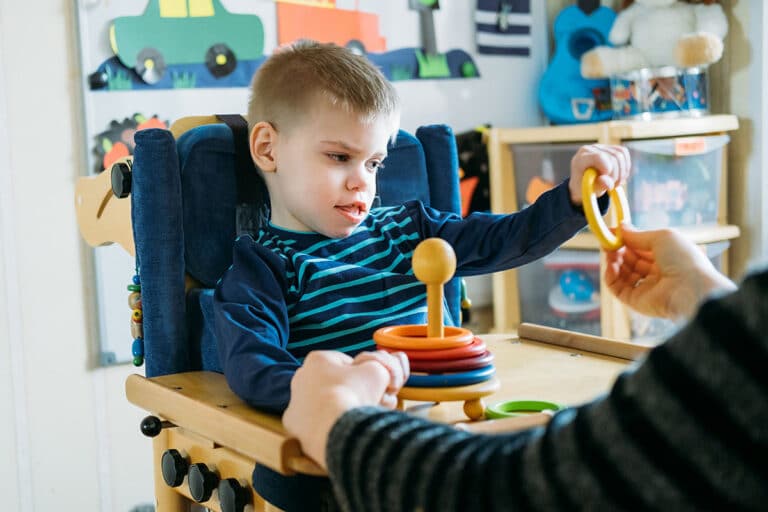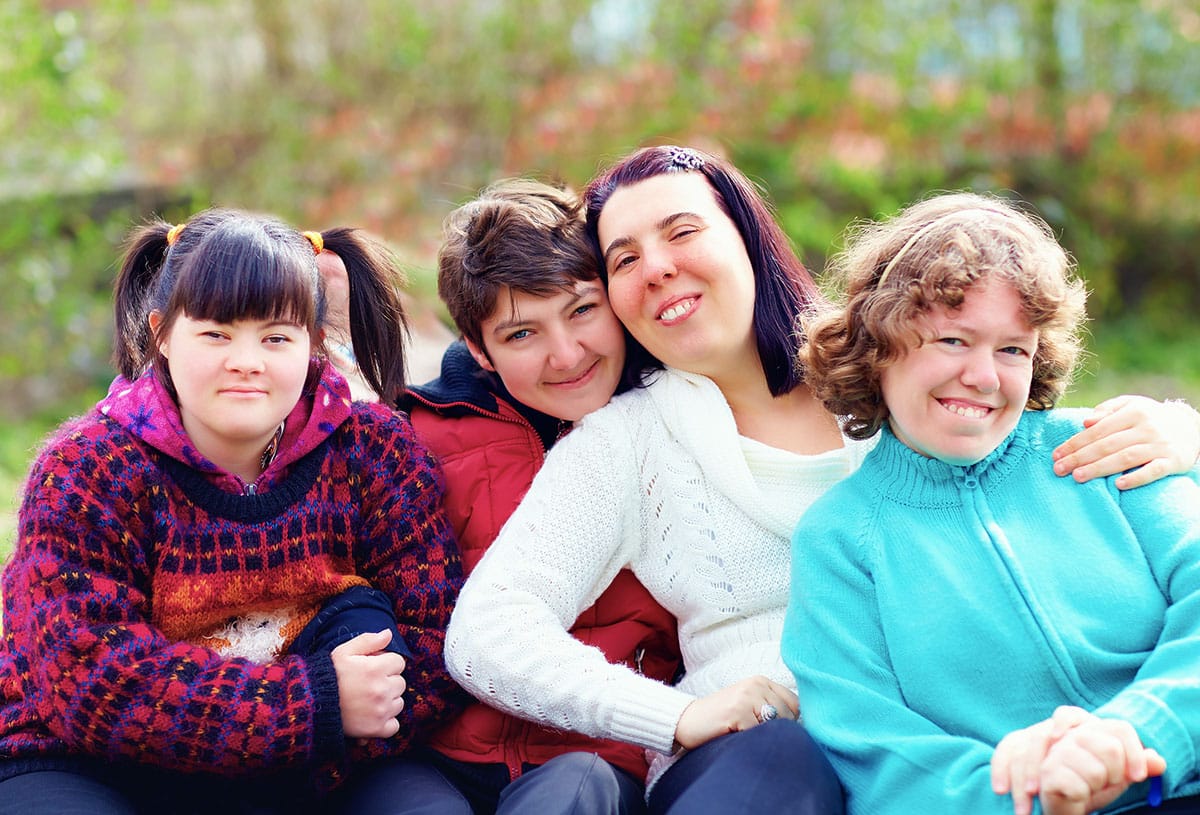ALPHABET SOUP: Terms, Titles, and Acronyms
| Term / Title / Acronym | Meaning |
|---|---|
| A | |
| ADA | Americans with Disabilities Act (Public Law 101-336) |
| AFO | Ankle-Foot Orthotic (brace) |
| ASL | American Sign Language |
| Acute | regarding illness, develops quickly and is short in duration |
| An- | prefix meaning “without” |
| Anoxia | a condition of insufficient oxygen |
| Ante- | prefix meaning “before” |
| Anti- | prefix meaning “against” |
| Apgar Score | score given to newborns, determines overall physical condition |
| Aphasia | difficulty with language (expressing or understanding) |
| Apnea | pause in breathing |
| Apraxia | movement difficulties caused by brain damage |
| Asphyxia | condition of too little oxygen in blood, risking brain damage or death |
| Aspirate | when solid foods or liquids go down the wrong pipe and into the airway or lungs-blocking the ability to breathe |
| Atonic | lacking muscle tone |
| Atypical | unusual, different |
| Audiology | study/practice of hearing & hearing disorders |
| B | |
| BVI | Blind/Visually Impaired |
| Baseline | the measure of frequency, duration, and intensity of behavior or ability before intervention |
| C | |
| CBC | blood test to measure types and numbers of cells, red and white, platelet count is determined and so is hemoglobin concentration |
| Cardiologist | Medical Doctor who specializes in evaluation and treatment of heart problems |
| Case Manager | the person responsible for identifying, coordinating and monitoring services and supports for a child, including medical and health needs, transitions and parent skill building. |
| Central Nervous System | brain and spinal cord: this area controls thinking, learning, speech and movement |
| CHIP | Children’s Health Insurance Program |
| Chronic | persistent, long lasting |
| Cognitive | relating to developmental area that involves thinking skills |
| Congenital | condition that is/was present at birth, acquired or inherited |
| Contracture | muscle becomes fixed in rigid, abnormal position |
| CYSHEN | Children and Youth with Special Health Care Needs |
| D | |
| DD | Developmental Disabilities |
| DDU | Disability Determination Unit |
| DHSS | Department of Health and Social Services |
| DLC | Disability Law Center |
| DPA | Division of Public Assistance |
| DVR | Division of Vocational Rehabilitation |
| Developmental Pediatrician | a pediatrician with specialized training in diagnosing children with developmental disabilities |
| Dysarthria | difficulty in speaking because of muscle movement and coordination |
| Dysphagia | difficulty in swallowing |
| DEED | Department of Education and Early Development |
| E | |
| EPSDT | Early Periodic Screening, Diagnosis and Treatment |
| EI | Early Intervention |
| Endocrinologist | a physician who specializes in treating problems of the endocrine system (glands that secrete into the bloodstream). This doctor might see a child with diabetes, growth, or hormone problems |
| ESER | Evaluation Summary and Eligibility Review (part of an IEP) |
| Expressive Language | communication by language, gesturing, sign language |
| F | |
| FASD | Fetal Alcohol Spectrum Disorder |
| FTT | Failure to Thrive (growth that is affected by malnutrition or chronic health disorders) |
| G | |
| GI | gastrointestinal |
| Gait | the manner of walking |
| Genetic | inherited |
| Genetic Counselor | provides information about hereditary disorders, confirms diagnosis and helps identify who in the family may be affected |
| H | |
| Hematologist/Oncologist | a doctor who specializes in the study and treatment of blood disorders/doctor who specializes in diagnosing and treating cancer |
| Hypotonia | low muscle tone, floppy |
| Hydrocephalus | accumulation of fluid in the brain |
| I | |
| IADL | Independent Activities of Daily Living |
| IDD | Intellectual and Developmental Disabilities |
| IDEA | Individuals with Disabilities Education Act |
| IFSP | Individual Family Service Plan |
| IEP | Individualized Education Program |
| ILP | Infant Learning Program (sometimes referred to as EI or Early Intervention) |
| L | |
| LD | Learning Disabilities |
| LOC | Level of Care |
| LOS/LON | Letter of Support/Necessity |
| LRE | Least Restrictive Environment |
| M | |
| Multidisciplinary Team | group of professionals who each represent an area of expertise |
| N | |
| Nebulizer | device used to provide mist/oxygen with or without medicine |
| Neonate | the term for a newborn baby during its first four weeks of life |
| Neonatologist | a pediatrician who has received extra training in the care of sick newborns or premature babies |
| Nephrologist | a doctor who specializes in treating the kidneys |
| Neurological Disorder | disorders of nervous system, like Spina Bifida, Epilepsy, Neurofibromatosis |
| Neurologist | a doctor who specializes in diagnosing and treating disorders of the brain and nervous system |
| Neuropsychologist | A psychologist who specializes in disorders associated with brain-based conditions |
| Neurosurgeon | a doctor who specializes in surgery on brain, spinal cord and nerves |
| NFLOC | Nursing Facility Level of Care |
| NICU | Neonatal Intensive Care Unit |
| Nutritionist | a specialist in nutrition who can help with health issues of food intake and diet |
| O | |
| OHI | Other Health Impaired |
| OT | Occupational Therapist/Therapy |
| Ophthalmologist | a doctor specializing in treatment and surgeries of the eyes |
| Orthopedist | a doctor who specializes in bones, joints, muscles, ligaments, tendons and cartilage |
| Orthotics | devices used to immobilize part of the body in order to prevent deformity or to assist with function |
| Otolaryngologist | a doctor specializing in the diagnosis, treatment and surgery of ears, nose and throat. Also called an “ENT” Specialist |
| P | |
| P&A | Protection and Advocacy |
| P2P | Parent to Parent/Peer to Peer |
| PCA | Personal Care Attendant |
| PO | for Latin words meaning “by mouth” |
| POC | Plan of Care |
| PT | Physical Therapist/Therapy |
| PTI | Parent training and information center |
| Pediatrician | a doctor who specializes in care for infants, children and adolescents |
| Periodontist | a dentist who specializes in treating the gums and tissues around the teeth |
| Perinatologist | a pediatrician with specialized training in fetal and neonatal care |
| Prone Position | lying on the stomach |
| Psychologist | a non-medical professional who works in the field of brain function and human behavior |
| R | |
| Rx | abbreviation for prescription |
| Range of Motion | flexibility that allows the span of movement possible of joints like wrists or hips |
| Receptive Language | the understanding what is being communicated |
| ROI | Release of Information |
| S | |
| SDS | Senior and Disability Services |
| SESA | Special Education Service Agency |
| SLP | Speech Language Pathologist |
| SN | Special Needs |
| SOA | State of Alaska |
| SSI/SSDI | Supplemental Security Income/Social Security Disability Income |
| Shunt | surgical procedure where catheter tube is used to drain excess fluid |
| Spastic | tight or stiff muscle tone causing difficulty with movement |
| Strabismus | eyes are not aligned during a forward gaze |
| Supine | lying on the back |
| T | |
| TEFRA | Tax Equity and Fiscal Responsibility Act; Medicaid eligibility based on disability |
| -tomy | suffix meaning “cutting” |
| U | |
| UAP | University Affiliated Program |
| V | |
| VI | Visually Impaired |
| W | |
| Waivers | programs through Medicaid to help provide services to individuals who need higher levels of care |
| WIC | Women, Infants and Children – Nutrition Program provides education |









